Overview
- Brief Narrative
- Jewish prayer book taken by thirteen year old Kurt Rosenbaum when he was sent by his parents on Kindertransport to Belgium in March 1939. Kurt eventually traveled to Portland, OR, and was adopted by the Goldsmith family. In September 1945, he was drafted into the US Army and sent to Okinawa, Japan.
- Title
- Daily Prayers with English instructions
- Date
-
publication/distribution:
1933
- Geography
-
publication:
Germany
- Credit Line
- United States Holocaust Memorial Museum Collection, Gift of Kurt R. Goldsmith in memory of his father, Kenneth Kurt Rosenbaum Goldsmith, and his grandparents, Frieda and Siegfried Rosenbaum
Physical Details
- Classification
-
Books and Published Materials
- Category
-
Books and pamphlets
- Object Type
-
Books (lcsh)
- Materials
- overall : paper, ink
Rights & Restrictions
- Conditions on Access
- No restrictions on access
- Conditions on Use
- No restrictions on use
Keywords & Subjects
Administrative Notes
- Legal Status
- Permanent Collection
- Provenance
- The book was donated to the United States Holocaust Memorial Museum in 2015 by Kurt Goldsmith.
- Funding Note
- The cataloging of this artifact has been supported by a grant from the Conference on Jewish Material Claims Against Germany.
- Record last modified:
- 2022-07-28 18:12:22
- This page:
- https://collections.ushmm.org/search/catalog/irn530442
Download & Licensing
In-Person Research
- By Appointment
- Request 21 Days in Advance of Visit
- Plan a Research Visit
- Request to See This Object
Contact Us
Also in Kurt (Rosenbaum) Goldsmith family collection
The collection consists of three china plates, tefillin and pouch, a tallit pouch, a kippah, correspondence, documents, an oral testimony, photographs, and publications relating to the experiences of the Kurt Rosenbaum (later Goldsmith) and his family in Schonungen, Germany, before and during the Holocaust.
Date: approximately 1939-approximately 1945
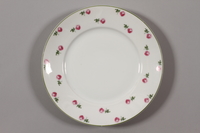
China plate with floral border recovered by a German Jewish family postwar
Object
One of three china plates (see 2015.365.3,4) hidden by neighbors of the Rosenbaum family in Schonungen, Germany, after the deportation of Siegfried Rosenbaum to Izbica in 1942.
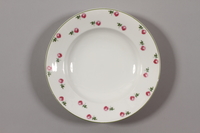
China plate with floral border recovered by a German Jewish family postwar
Object
One of three china plates (see 2015.365.2,4) hidden by neighbors of the Rosenbaum family in Schonungen, Germany, after the deportation of Siegfried Rosenbaum to Izbica in 1942.
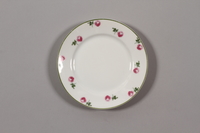
China plate with floral border recovered by a German Jewish family postwar
Object
One of three china plates (see 2015.365.2,3) hidden by neighbors of the Rosenbaum family in Schonungen, Germany, after the deportation of Siegfried Rosenbaum to Izbica in 1942.
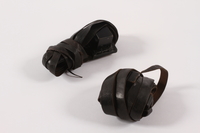
Set of tefillin carried by a young German Jewish Kindertransport refugee
Object
Tefillin pair taken by thirteen year old Kurt Rosenbaum when he was sent by his parents on Kindertransport to Belgium in March 1939. Tefillin are small boxes containing prayers attached to leather straps and worn on the arm and the head by Orthodox Jewish males during morning prayers. Kurt eventually traveled to Portland, OR and was subsequently adopted by the Goldsmith family. In September 1945, he was drafted into the US Army and sent to Okinawa, Japan.
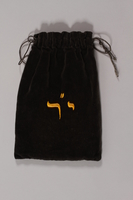
Monogrammed gray velvet tefillin bag carried by a young German Jewish Kindertransport refugee
Object
Gray velvet tefillin pouch used by thirteen year old Kurt Rosenbaum to carry his tefillin when he was sent by his parents on a Kindertransport to Belgium in March 1939. Tefillin are small boxes containing prayers attached to leather straps and worn on the arm and the head by Orthodox Jewish males during morning prayers. Kurt eventually traveled to Portland, OR and was subsequently adopted by the Goldsmith family. In September 1945, he was drafted into the US Army and sent to Okinawa, Japan.
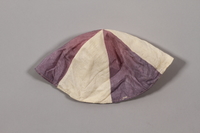
Yarmulke carried by a Kindertransport refugee
Object
Kippah taken by thirteen year old Kurt Rosenbaum when he was sent by his parents on Kindertransport to Belgium in March 1939.
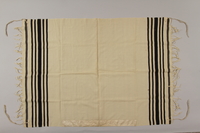
Tallit carried by a Kindertransport refugee
Object
Tallit taken by thirteen year old Kurt Rosenbaum when he was sent by his parents on a Kindertransport to Belgium in March 1939.
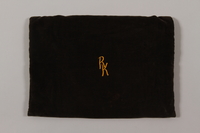
Tallit bag carried by a Kindertransport refugee
Object
Tallit bag taken by Kurt Rosenbaum as he was sent by his parents on a Kindertransport to Belgium in March 1939.
Rosenbaum family collection
Document
Documents, correspondence, and photographs, including nametag #34 given to Kurt Rosenbaum by the American Friends Service Committee as he sailed from Lisbon on board Portuguese ship SS Mouzinho and arrived in New York on June 21, 1941 as part of the first transport of the US Committee for the Care of European Children. Kurt travelled to Portland, OR and was subsequently adopted by the Goldsmith family. In September 1945, he was drafted into the US Army and sent to Okinawa, Japan. Includes an honorable discharge certificate for the US Army, and copy of German birth certificate issued to Kurt.
Book
Object
Jewish prayer book, Hours of Worhsip, taken by thirteen year old Kurt Rosenbaum when he was sent by his parents on Kindertransport to Belgium in March 1939. Kurt eventually traveled to Portland, OR, and was adopted by the Goldsmith family. In September 1945, he was drafted into the US Army and sent to Okinawa, Japan.
Book
Object
Jewish prayer book taken by thirteen year old Kurt Rosenbaum when he was sent by his parents on Kindertransport to Belgium in March 1939. Kurt eventually traveled to Portland, OR, and was adopted by the Goldsmith family. In September 1945, he was drafted into the US Army and sent to Okinawa, Japan.

Presentation by Kenneth Rosenbaum Goldsmith
Oral History
Kenneth Rosenbaum Goldsmith (Kurt Simon Rosenbaum), born in April 1926 and raised in Schonungen, Germany, describes his family leaving Germany on March 13, 1939 when he was almost 13 years old; departing from Wurzburg, Germany and going to Antwerp, Belgium; the beginning of the war; fleeing with his family to France; staying in a detention camp south of Paris; being chosen to go to a children’s home in Limoges, France for three months; contracting the mumps; going by train through Spain to Lisbon, Portugal; leaving on the SS Mouzinho with other Jewish children; conditions on the ship; arriving in New York, NY in June 1941 and going through the immigration process; living in a children’s home in New York, NY called “The Academy” (on 137th Street); the distribution of refugee children around the US; going to San Francisco, CA for two weeks; the children’s frightened reactions to the fireworks on July 4, 1941; arriving in Portland, OR July 8, 1941; being taken in by the Goldsmith family as a companion for Peter Lipschitz; attending Benson High School; being drafted into the US Army and receiving his US citizenship; the other children that came with him to Pacific Northwest; and the fates of his family members.



